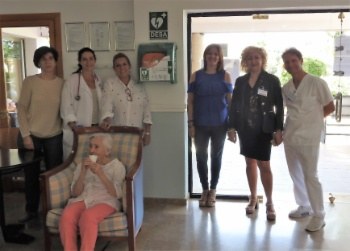
Tuesday 9th October 2018
ONE OF EVERY SIX RESIDENTS IN THE SENIOR CITIZENS HOME OF CALVIÀ HAS A BED ADAPTED FOR GREAT DEPENDENTS
In addition, the senior citizens' home has been certified as a cardioprotected centre
The Senior Citizens Centre of Calvià has 10 new beds for residents with great mobility dependence. Thus, the Home's users can be better cared in terms of wellbeing and autonomy, as well as increase the Home's staff comfort in the care they provide to great dependents, since caregivers will not have to carry out overexertions and they will prevent possible work accidents.
They are electric articulated height adjustable beds with electric control that can adopt multiple positions for great dependents. All this facilitates the mobilisation and movements from the bed to the wheel chair of the dependent persons and also allows adopting the most appropriate posture for the patient, as well as for the caretaker staff that performs the mobilisations and the service personnel who make the beds. On the other hand, these beds include a viscoelastic thermosensitive mattress that distributes the weight of the bedridden person and prevents the onset of pressure ulcers. The Senior Citizens Home of Calvià with this new acquisition continues progressing towards the goal of offering a person-centered and quality service to users.
The Senior Citizens Home of Calvià is a cardioprotected centre
The staff of 50 people of the Senior Citizens of Calvià have been trained in cardiopulmonary resuscitation for the use of external defibrillators in recent months. Through an eight-hour course and together with the installation of a defibrillator in the Senior Citizens Home of Calvià, the centre has been certified as cardioprotected, that is, capable of assisting a person in the first minutes of a cardiac arrest.
The Senior Citizens Centre of Calvià has 60 residents and day centre users, but also receives family members and other visitors. According to various scientific studies it has been shown that the use of semiautomatic defibrillators in programmes of immediate attention performed by non-health care personnel in public spaces can save the life of people suffering from ventricular fibrillation.




